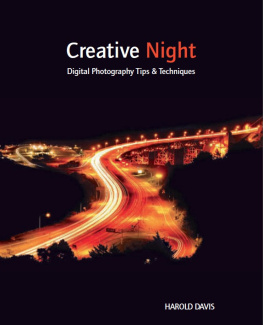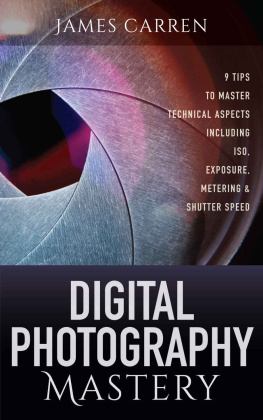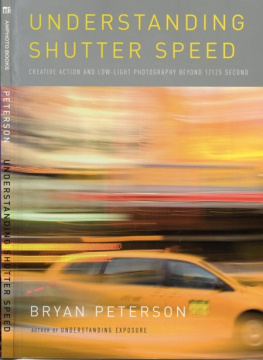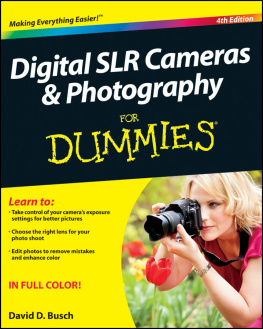Contents
Mastering Digital Photography:
Jason Youn's Essential Guide to Understanding the Art & Science of Aperture, Shutter, Exposure, Light, & Composition
Jason Youn
Edition 2
For my girlsKristan,Elle & Juliet.
To better use the images in this book, on a Kindle Touch, or Paperwhite, place your finger on the desired image for a moment, and a magnifying glass icon will appear. Tap that icon and the image will then take up the entire screen. You may need to rotate your Kindle for better viewing. When you are done examining the image simply tap the screen again to return to the text. For the non-touch Kindles, use your cursor button, and you can select the image and then zoom in. Select again to return to the text.
Foreword
Photography is something to be loved, explored, learned, and practiced. One summer in the late 1980's when I was still just a kid, our family was off to see the Grand Canyon. As we prepared to embark on our road trip, my dad purchased a pair of matching cheap plastic 110 format point and shoot cameras, one for my brother Andrew and the other for me. We would spend hours of our trip taking pictures of just about anything. It's a wonder that there was even film left to be shot in our cameras after the half day trip to America's great natural wonder. By the time we arrived, we had discovered that our favorite game was to see if we could make a photograph of each other at the exact same moment so that we could capture the other camera's flash on film. This effort did not produce the magical effect we had in mind. Actually, it proved itself impossible, and we ended up with several spent rolls of really awful images. From looking over our developed photographs, you would never guess that we actually went to the Grand Canyon. For the most part, our photos were of the inside of pockets, a random squirrel as it ran past, or each other as we worked for our illusive simultaneous flash shot. As the years passed, I continued to waste time and film making really bad photographs; each one seemed worse than the one before, but it was still fun, and I was still shooting.
Soon I would discover the moving picture. With my parents' old Hi8 camera in hand, my friends and I set out to create a cinematic reproduction of Jules Verne's, A Journey to the Center of the Earth. After hours of work, a few pounds of gunpowder extracted from a model rocket kit, and the occasional feeling of panic as we searched for the fire extinguisher, our film was done. Once again, our special effects would not make up for bad camera work. The project was shelved and never seen again.
In high school I began taking photography classes. This time I had with me a Single Lens Reflex Camera (SLR) that shot 35mm film. The instructor tried to teach her pupils the finer points of black and white photography, but it was not the breakthrough I was looking for. A major problem for me was the textbooks, filled with complex information and arranged in a way that made little sense. They proved to be more infuriating than informative, and at 300+ pages, they were too long to be useful to a beginner, or probably anyone for that matter. Although that class and textbook nearly killed it, my love of photography and cinematography remained strong and I sought richer waters.
Luckily college offered me an ocean. I attended film school specifically to learn how to become the next Tim Burton. Though I studied motion picture, script writing, cinematography, and lighting, my experiences expanded beyond the motion picture and I learned more about still photography at that school than at any other single place. The complexities of it all began to fit together. The relationships between ISO, aperture, shutter speed, and lighting came into focus -- and so did my images.
After a short career in television, I decided I loved the craft, but the industry was not for me and I went back to school to earn a degree in Art History with a minor in Religious Studies from ASU. I kept working with still photography.
Soon my work got some attention, won some awards, and people began to hire me to do everything from weddings and portraits, to sports, catalogues, school photos, and product shots. I began doing art shows and selling my landscape work; over time my skill grew right along side my business. The more I shot, the more people kept asking for advice with photography.
I found that I was good at instructing people on how to use their own cameras. All those numbers, dials, buttons, and settings mean something, and if you learn how and why to use them, you will be a better photographer. Beyond that my BA in Art History has shown me that there are some simple rules of art and design that humanity has spent the last 3,000 years or so mastering. In the later parts of this book I'll use both text and images to show you what they are, and when to use them. Keep them in your mind as you shoot.
I created this book because I want you to go from just taking pictures to creating photographs. Anyone can learn how to create beautiful images and you don't need an expensive camera to do so, but you do need just a little bit of information and a good deal of practice. While you read this book, keep your camera and your camera's photo manual near by. Highlight the portions you want to remember (yes, your Kindle can do that. If you have a Kindle Touch or Fire, simply hold your finger over the first word you want to highlight and then drag your finger to the last word you want to highlight. This info will then be saved for you to access later.) Try working with the camera's settings as you go. See what works and what doesn't. If you are the log book or journaling type, keep a record of your actions and the results. Don't be afraid to jump right in and try experimenting; sometimes the best photos happen completely accidentally.
*Chapter One: The Camera
The Camera
From DSLRs to Camera Phones, Water Proof to Infrared, there are more camera types out there than ever before. Making the right choice when buying a camera can seem daunting and difficult. You don't want to spend too much money, but you don't want a camera that will underperform either. I have been asked time and again for advice on what camera to buy and I almost always answer with a question, "What do you plan to use your camera for?" Some cameras, usually the expensive ones, will allow you to make virtually unlimited changes to the settings and the way the camera captures an image; others have little more than a few auto exposure modes and button on top. Size and weight, durability, functionality, quality, and cost all factor in to my answer.
I'm a bit of a camera geek, and I love my high end cameras. On my first photography trip to the wilderness of the far northern portion of Arizona, a seasoned old photographer gave me some advice, "Buy the best camera you can afford." It was obvious that he had taken his own advice. He carried with him two of the highest end SLR 35mm film cameras made, each with top quality lenses, while I carried a mid-grade 35mm with a mid-grade lens, which at the time, was all I could afford. There was some wisdom in his advice, and his photos gathered from around the world were beautiful and very well crafted, and while $9,000 strapped to your shoulder can help, nothing can replace good camera work and the skillful application of the rules of art. Without those, even the world's best camera will not create a great photograph. Because of this, the best camera to use may just be one that you already have handy. If you understand the rules of photography and art, a small point and shoot, or even a camera phone can make a striking image that will have an impact on your audience.
The photography book The Best Camera Is The One That's With You,





